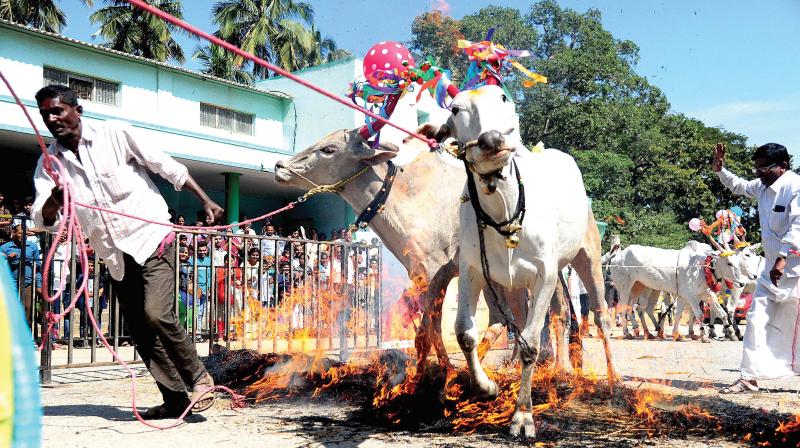A slice of rural Karnataka at Lalbagh garden
Lalbagh looked more like a boisterous village fair, instead of a quiet garden.

Bengaluru: Folk dance, drum beats, kite flying, bedecked cows, savouring sweet pongal and millets, marked the sunny Sunday afternoon at Lalbagh, where thousands thronged to celebrate Suggi Huggi Habba. Organised by Agriculture Department, along with Kannada and Culture Department, to celebrate Sankranti, Lalbagh looked more like a boisterous village fair, instead of a quiet garden.
Various agriculture federations from different villages and taluks, showcased their traditional foods to a largely urban crowd. Each of their stalls had the traditional Sankranti arrangement with pots, rice, jaggery, cashew nuts, raw sugarcane stalks and more.
Karnataka Agriculture Minister Krishna Byregowda inaugurated each of the stalls by conducting Rashi Pooje, after which he participated in the largest millet ceremonial cooking of Huggi, organized by Akshaya Patra Foundation.
Gowda stirred a large vessel containing Huggi (rice and moong dal savoury) for over 15,000 people, along with Umashree, Minister for Women and Child Development and Chanchalapathi Dasa, V.C. of Akshaya Patra Foundation. Distributed for free in small organic leaf cups was pongal made of pearl millets and sweet pongal of Sorghum Flakes. He participated in the kite flying, tugging a broad colourful nylon kite on the boulders of Lalbagh.
Agriculture producers representing various villages of Karnataka, presented wide variety of Sankranti delicacies to people, interacting with the visitors on how the festival is celebrated.
Twenty people from a farmer's federation in Sakleshpur, were dressed in British style black coats and white shirts. Traditional craft stalls were also put up to sell handicrafts, toys, bags and kites. Several citizens took breaks to sit under a large tent, with chairs, watching the stage performances of Dollu Kunitha, traditional Kodagu dancers performing Ummatthat, singers and MCs constantly attracting the crowd's attention.
Around 1 pm, Kichchu Haisodu, the fire crossing ritual by bulls began. They were brought from several districts including Anekal, Kagalippura, Bengaluru South. Men and women would hold on to the bovine's painted horns, urging it towards the fire and jumping over the flame together.

